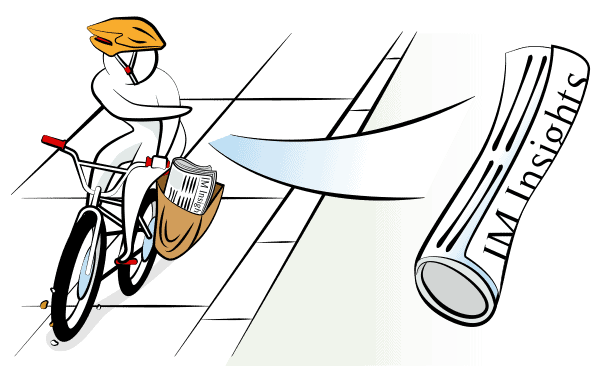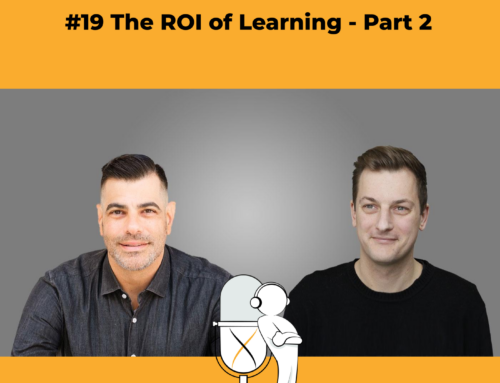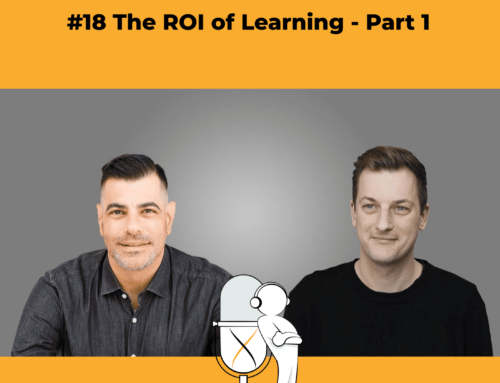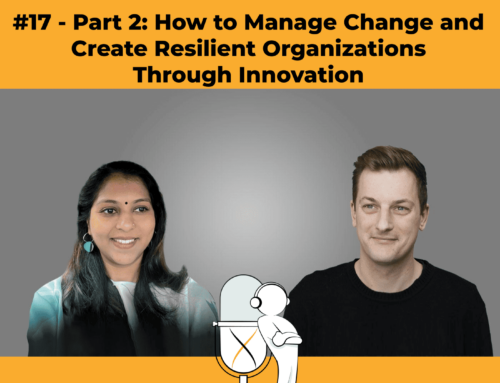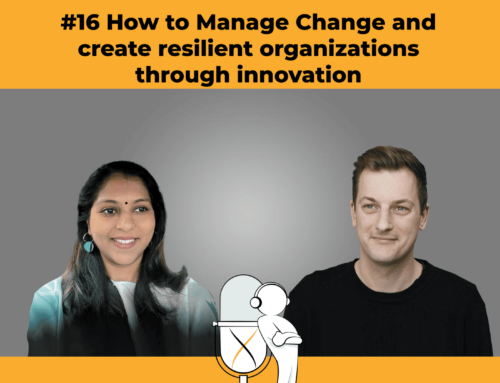Episode 11 – Breathing Life into Organisations on Innovation Life Support
About the Episode
Elijah Eilert is talking to Susie Braam about what keeps innovators within large organisations going and what makes it really hard for them. Susie shares what good leadership behaviour looks like, the problems with short-term thinking and how to carve out the necessary space for a strategic approach to innovation.
Topics and Insights
- (01:00) Introducing Susie Braam
- Co-Founder of Yellow Cat – an innovation coaching, consulting and training company. Susie describes the reason for setting up the company.
- Founder of Mulberry Retreats – focusing on leadership development.
- Career working for the British government in positions such as Head of Innovation for the Foreign Office and Ministry of Defence as well as senior leadership roles in digital transformation for the UK government.
- (08:00) On Setting up an incubators and what not to do.
- (11:00) Innovation in large organisations as career suicide and what keeps intrapreneurs going.
- (14:00) On bad leadership behaviour and how not to fund projects.
- (16:00) How leaders are used to looking for the “nearest crocodile to the canoe while ignoring the tsunami at the horizon” i.e. the problem with short-term thinking.
- (17:00) The reasons for short-term thinking in government organisations vs for-profit companies.
- (18:30) Book recommendation to foster – The Infinite Game by Simon Sinek
- (19:00) Leadership training and the struggle with the application of effective innovation management in a system where incentive structures are misaligned. Even the most convinced and willing executives struggle if the innovation ecosystem is not designed appropriately.
- (21:00) On the importance of carving out time for strategic goal setting and how to do it.
- (24:00) There is an unhelpful narrative that if we are not running around looking stressed and busy we are not productive and important.
- (25:00) How difficult it is to lead change, innovation or transformation in organisations that are not designed to change much.
I guess what I found it’s a bit like being a mom, actually, a parent. I felt every day I was giving so much of myself. I was so emotionally invested. And I think the emotional toll at times on me. When you care about the future of your organization, you can see if certain changes aren’t made, that future could be precarious. And every day you’re struggling to shift that conversation like the tiniest amount. And what I found I needed was things that I need to fill my cup back up.
- (28:00) The characteristics of people who are effective innovators within large organisations.
- (30:00) The importance of defining the impact of each project.
- (31:30) People that keep going in innovation are often those who really care, but this may also make it especially hard on them. Elijah makes a questionable claim about the percentage of psychopaths managers in supply chain, based on a vague memory. Some links for further reading on the topic of people with difficult and destructive personality types in the workplace
- Psychopathy in the workplace
- The Disturbing Link Between Psychopathy And Leadership
- Senior Executives Are More Likely To Be Psychopaths
- Why supply chain managers are psychopaths (Looks like Elijah’s memory was correct after all. Good for him but bad for team members!)
- (34:30) Organisations that don’t want to change can feel like a terminally ill patient, which can be a heartbreaking experience.
- (36:00) How the type of work keeps us going but more so the people we are working with and how managers are often the biggest barrier to innovation success.
- (44:00) The importance of a more senior person that has your back for a corporate explorer – who are they and how to find them.
- (46:30) On psychological safety amongst leadership.
- (51:00) Innovation culture and the proposition that not everybody has to innovate.
- (54:30) The problem with “2 days strategy offsides”.
- (55:30) No different from a product, an innovation strategy is a hypothesis, one big idea if you will. It is unproven and often risky. To deal with this, organisations need more agile strategies, collect data early and admit if something is wrong. Find out more in Susie’s article Adaptive Strategy.
- (58:00) Cut: A deep dive into the article had to be cut, due to a very long recording session.
- (59:00) On Susie’s retreats for senior leaders.
- (01:01:00 Leadership as a privilege.
- (01:02:30) Cut: Same as above, due to a very long recording the episode had to be shortened. The topic was the possibility of starting peer coaching group for corporate innovators – a safe space for innovation leaders to learn and grow. This topic lends itself to its own episode one day.
- (01:03:00) Plugging Gymea Retreat and the idea to get Mulberry Retreats to Australia.
- (01:03:30) The cathartic aspect of recording a podcast as well as writing articles.
Peer Coaching for Corporate Innovators

Connect with Susie
About the Guest

Corporate Experience
Susie Braam spent 19 years in the public sector working a broad spectrum of roles and experiences. Predominantly in the National Security arena, she dealt with many fast-paced, changing and complex situations.
Between 2016 and 2021, Susie led innovation and digital transformation efforts within the UK Government as Head of Innovation first at the Ministry of Defence and then at the Foreign, Commonwealth and Development Office. In 2017, she set up and ran an Incubator comprising multi-agency and multi-disciplinary teams to iteratively design and develop solutions to some of the most challenging and complex problems in the national security space using a disciplined approach to innovation.
Moving on in 2018 to look at the organisation-level innovation ecosystem, she designed and developed innovation strategy and governance; provided education, awareness and skills in innovation; tackled the friction and bureaucracy that slows progress; and developed organisational mindset and culture to explore alternatives to the way things have always been done.
Since 2021, she has been advising a cross-organisational executive team on digital transformation. Her specific focus is on supporting leadership team dynamics and alignment, encouraging user-centred approaches to transformation, promoting equity, diversity and inclusion and coordinating future-focussed strategy.
Entrepreneur and Founder
In 2020, Susie co-founded Yellow Cat, an Innovation Training and Coaching company focussed on supporting those corporate heroes who are trying to transform their organisations from within. Yellow Cat also supports student innovation teams, start-ups and small businesses in business model design and development.
In late 2020, the end of a challenging and tumultuous year, Susie went on to establish Mulberry Retreats, with the aim of providing sanctuary and optimism to individuals in challenging leadership positions. Based on her first-hand experience, Susie believes strongly that leaders can make or break both people and organisations. The mission at Mulberry Retreats is to empower leaders with the mindset, skills and confidence to create a positive future for themselves, their organisations and the people within.
Guest Speaker and Writer
Susie routinely writes and speaks about leadership, strategy and innovation, providing insights from her experience and thought leadership. She has a natural and engaging style and her refreshingly candid approach makes her a popular speaker.
Susie lives in south-east London with her family.
Show Transcript
Sign up for the latest on Innovation Accounting, Lean Startup, Workshops and Innovation Ecosystem Design.
RELATED INNOVATION WORKSHOPS & TRAINING
